While the term “cultural genocide” may not apply to Canada, the government intentionally imposed harmful conditions on Indigenous communities
 In a recent commentary published by Troy Media, anthropologist Hymie Rubenstein argues that the term “cultural genocide” is not appropriate to describe the experience of Canada’s Indigenous population, especially as it relates to residential schools.
In a recent commentary published by Troy Media, anthropologist Hymie Rubenstein argues that the term “cultural genocide” is not appropriate to describe the experience of Canada’s Indigenous population, especially as it relates to residential schools.
I agree with Rubenstein. While Raphael Lemkin, the Polish Jewish lawyer who coined the term genocide in 1944, wrote about cultural genocide, the term was not included in the 1948 United Nations Genocide Convention, which has become the only universally accepted definition of genocide. It states:
In the present Convention, genocide means any of the following acts committed with intent to destroy, in whole or in part, a national, ethnical, racial or religious group, as such:
- Killing members of the group;
- Causing serious bodily or mental harm to members of the group;
- Deliberately inflicting on the group conditions of life calculated to bring about its physical destruction in whole or in part;
- Imposing measures intended to prevent births within the group;
- Forcibly transferring children of the group to another group.
 |
| Related Stories |
| The tragic fate of Artsakh Armenians: The ignored refugee crisis
|
| The absurdity of the Israeli genocide accusation
|
| Origins of the Armenian Genocide trace back to the early 1900s
|
Interestingly, point 5 is the only element of Lemkin’s concept of cultural genocide that was included in the legal definition of genocide. It should also be noted that Canada’s residential school system was in operation in 1948, and Canada was reluctant to ratify the Convention.
It is essential to note that “intent to destroy, in whole or in part, a national, ethnical, racial or religious group” is required for any of the five acts listed to be considered genocide. When examining earlier renditions of the Indian Act or the statements of Canadian government officials, the intent is quite clear.
In the early 1900s, children attending residential schools were dying of tuberculosis at frighteningly high rates. Public health specialist Dr. Peter Bryce proposed a plan to significantly reduce these numbers, but it was rejected. Duncan Campbell Scott, Deputy Superintendent of the Department of Indian Affairs, reflected the sentiments of our government, stating, “It is readily acknowledged that the Indian children lose their natural resistance to illness by habitating so closely in the schools, and that they die at much higher rates than in their villages. But this alone does not justify a change in the policy of this department, which is geared toward the final solution to the Indian problem.”
An honest examination of Canadian history in the 19th and early 20th centuries forces one to recognize that other elements of the Genocide Convention are applicable. The Canadian government was intent on bringing European settlers to Canada, and it is hard to deny that it imposed conditions aimed at destroying the Indigenous population, at least in part, to make this possible. It is also undeniable that the Canadian government inflicted serious physical and mental harm on many Indigenous Canadians.
While I agree that the term “cultural genocide” does not apply to Canada, there is one phrase used by Rubenstein that I take exception to. He referred to Indigenous Canadians as “eternal victims.” The crime of genocide was committed by the Canadian government against Indigenous Canadians. Indigenous Canadians, however, are strong and resilient, and they are challenging Canada to become a better country through acts of reconciliation.
In the last 10 years, we have more effectively adopted Indigenous pedagogical principles in our schools, and these are allowing teachers to better serve all students, not just those who are Indigenous. Similar principles are being applied to our healthcare and legal systems. This doesn’t mean we are abandoning European institutions; rather, we are enhancing them for the benefit of all Canadians.
As the great Jewish writer Martin Buber stated, “One gains power over the nightmare by calling it by its real name.”
Gerry Chidiac specializes in languages and genocide studies and works with at-risk students. He received an award from the Vancouver Holocaust Education Centre for excellence in teaching about the Holocaust.
For interview requests, click here.
The opinions expressed by our columnists and contributors are theirs alone and do not inherently or expressly reflect the views of our publication.
© Troy Media
Troy Media is an editorial content provider to media outlets and its own hosted community news outlets across Canada.


